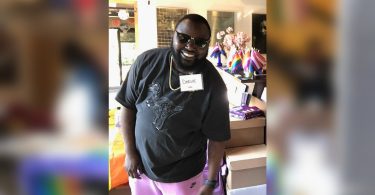State officials and LGBTQ Pennsylvanians gathered in the capitol Wednesday for the annual Transgender Day of Remembrance, recognizing those who have lost their lives over the past year due to discrimination.
The event, first started in 1999, marks a growing recognition that transgender people are particularly prone to violent deaths driven by bigotry, and calls for political action to prevent this – especially relevant in the wake of this year’s election, several speakers at Wednesday’s event said.
“The loss of even one transgender person’s life to violence or to suicide is one life too many, and has ripple effects that are felt for years,” said Val Arkoosh, Pennsylvania’s Secretary of Human Services, and “each of us must commit to this ongoing work to create more inclusive spaces.”
“I’ve been asked many times during the last two weeks how I am feeling,” Arkoosh continued. “My answer is simple. I am resolute. I know this community knows more than most what it means to be resolute in the face of seemingly overwhelming obstacles.”
According to tracking by the Human Rights Campaign, 36 transgender Americans were killed in the past year, continuing an upward trend – although it’s unclear how much of this is an increase in violence and how much is due to better reporting, with the actual number of deaths almost certainly being much higher.
The number also grows if one expands the definition beyond homicides and includes other violent deaths, including suicides that may have stemmed from discrimination or harassment.
Data used by the Governor’s Advisory Commission on LGBTQ Affairs cited 63 violent deaths of transgender Americans in the past year, with four in Pennsylvania that included one highly-publicized murder. The commission erected a memorial of 63 flags on the capitol grounds in Harrisburg this week.
One of those four was Ashton Myles Clatterbuck, a transgender man and political activist from Lancaster County who took his own life this past February.
“I am certain that this incredible human being is no longer with us because our society failed him,” said his mother, Malinda Harnish Clatterbuck.
Too often, transgender people are “not welcomed but also persecuted, antagonized, and discriminated against,” she said. Before his death, Ashton was “profoundly concerned about the anti-trans policies sweeping the nation in the past several years.”
Such concerns, several speakers noted, have been particularly heightened since this month’s election of Donald Trump alongside a Republican-led Congress that has signaled hostility toward a number of LGBTQ rights issues.
On Wednesday, U.S. House Speaker Mike Johnson, R-Louisiana, stoked the flames by issuing an order preventing transgender people from using bathrooms in the Capitol that match their current gender expression, a move directed toward incoming Rep. Sarah McBride, the first transgender person elected to Congress.
Trump also received significant political support from groups that have pushed schools to limit access to limit LGBTQ materials in libraries, prohibit teachers from referring to students by their requested pronouns, and other restrictions.
In Harrisburg, the state legislature is split between a Democratic-majority House and a Republican-controlled Senate. Last year, the former successfully passed a bill adding LGBTQ people to the state’s non-discrimination ordinance, but the Senate GOP leadership declined to take it up, and the bill will have to be re-filed and passed again when the new session cycle starts next year.
“You know, we’re always looking for the Senate to take up some of these common-sense, freedom-based bills that are going to make Pennsylvania a more attractive, healthier, safer place for people to come work, learn, live and love,” said Rep. Izzy Smith-Wade-El, D-Lancaster County, a member of the legislature’s LGBTQ Equality Caucus.
Relevant to the current controversy in Washington, Smith-Wade-El has a bill that would require Pennsylvania schools to have gender-neutral restrooms in order to blunt the issue, one Democrats have described as a solution in search of a problem that is being used to intimidate transgender youth.
“I think we’re going to pass the bills” through the House in the new session, Smith-Wade-El said, “and our challenge is going to be with our colleagues in the Senate.”
The executive branch also has some unilateral power. Former Gov. Tom Wolf, for instance, ordered state insurance regulators to scrutinize claims for “conversion therapy,” which seeks to turn LGBTQ people straight.
The vast majority of physicians consider such psychotherapy to do much more harm than good, and to be a significant driver of suicide. Earlier this year, several state medical boards formally rejected the practice as pseudoscience in a move hailed by current Gov. Josh Shapiro.
The administration is continuing to look at regulatory issues such as bathroom access in state buildings, training standards promulgated by state agencies and steering funding to health and housing services that support LGBTQ Pennsylvanians.
“All the stuff we’ve been talking about is stuff that we’ve been working on for a couple of years now,” said Ashleigh Strange, director of the Governor’s Advisory Commission on LGBTQ Affairs.
With the election, “the awareness of everyone to these needs has gone up,” Strange said, “and so we’re just continuing to do the same work we’ve been doing to protect everybody.”
This month’s loss at the top of the ticket has promoted some Democrats to speculate that the party was too vulnerable to Republican attacks on transgender issues. Asked about the matter after Wednesday’s event, Smith-Wade-El said anyone who claims the issue was a significant component of Democrats’ losses “frankly are bad at math.”
Trump’s victory, Smith-Wade-El pointed out, was due primarily to a collapse in enthusiasm and turnout among some of Democrats’ core constituencies. Most polling indicates that this was driven by perceptions of the economy, with LGBTQ rights ranking much lower as a motivating issue for voters.
Polling on transgender issues varies widely by policy. Americans overwhelmingly support including transgender and other LGBTQ people in anti-hate-crimes laws, according to YouGov tracking; conversely, most Americans oppose allowing transgender people to play on sports teams that don’t match their gender at birth.
Notably, most Americans also have very skeptical views on how the topic is being used. An LA Times poll found that 77% of Americans believe transgender issues are being used to distract from more important matters as opposed to being an crucial priority for lawmakers in its own right – suggesting that the average voter is more cynical about transgender rights than they are polarized against them.
Democrats like Smith-Wade-El have said that abandoning transgender constituents would be a losing move both morally and politically, given how much they intersect with other core elements of the Democratic coalition.
“What folks seek to do when they make comments like that is they seek to separate out the trans and LGBTQ community,” Smith-Wade-El said, but “it turns out the constituencies that make up the Democratic Party also include trans people – many trans people.”
“Almost every trans person I know is a member of the working class,” Smith-Wade-El continued, and any Democrat who thinks that alienating them would be politically advantageous needs to “find their way back to building bigger coalitions, not smaller.”







